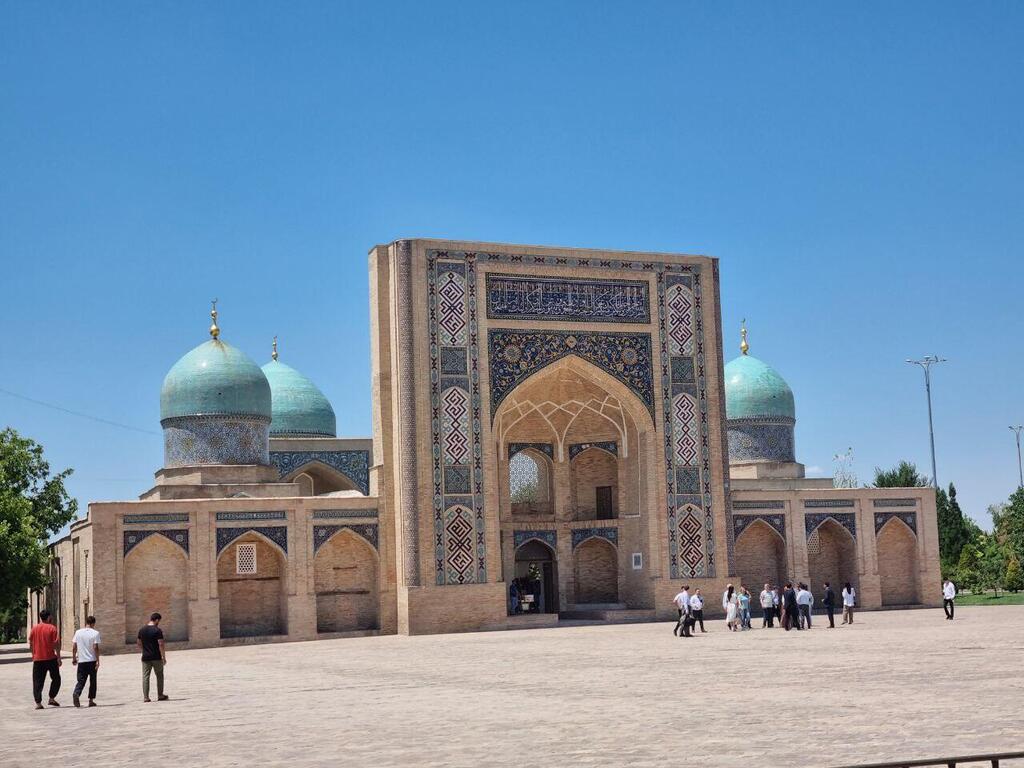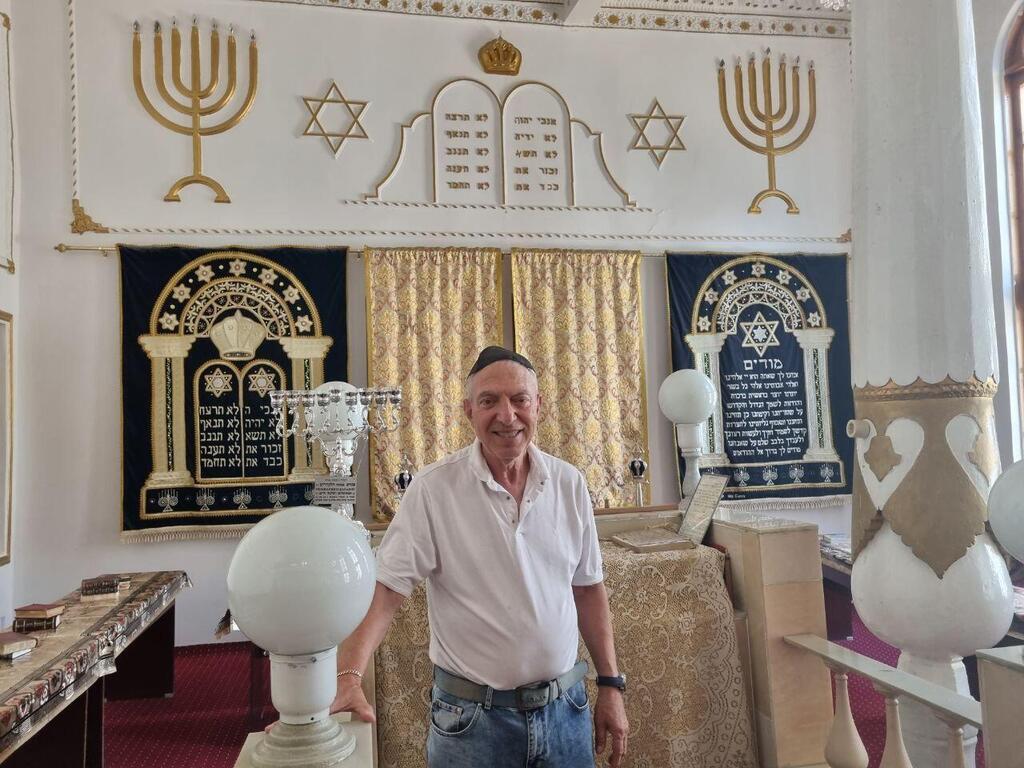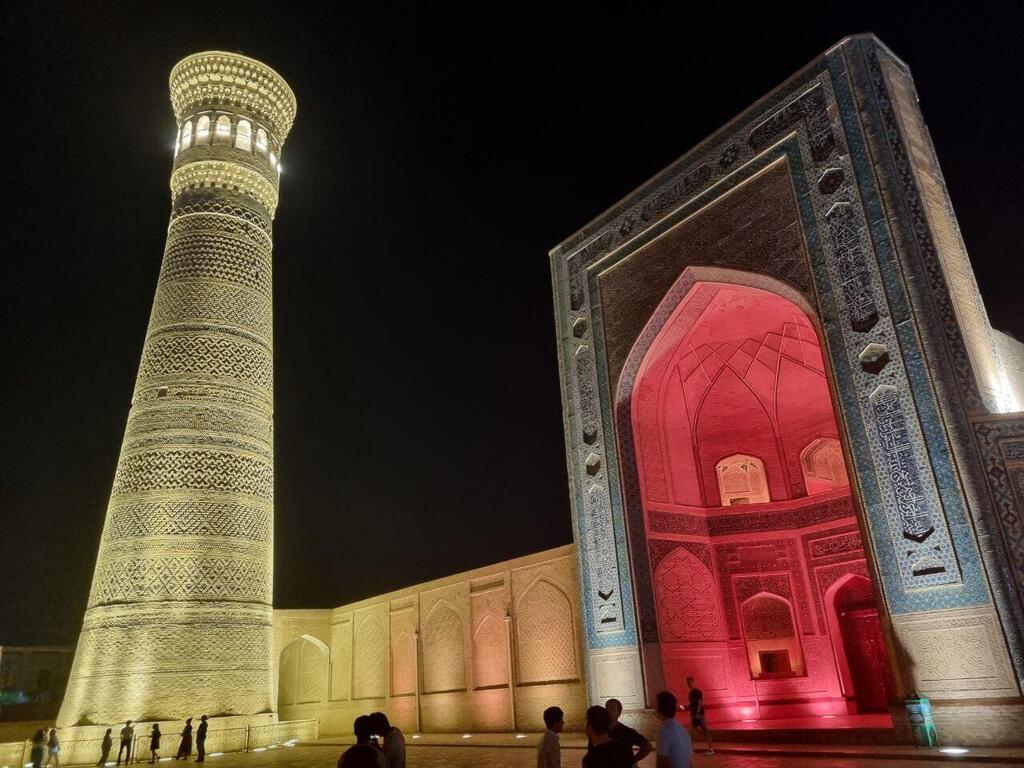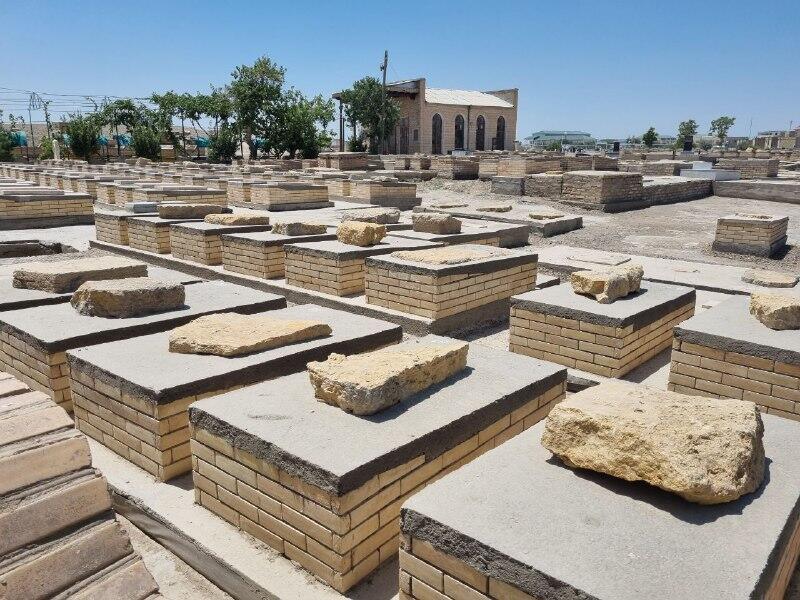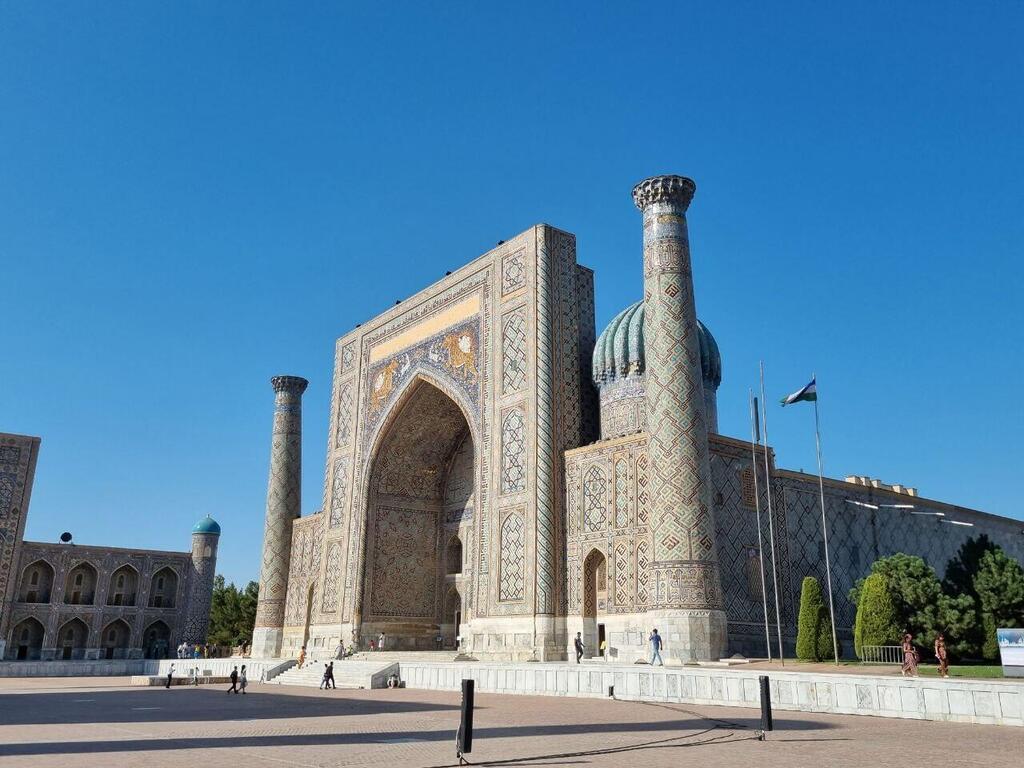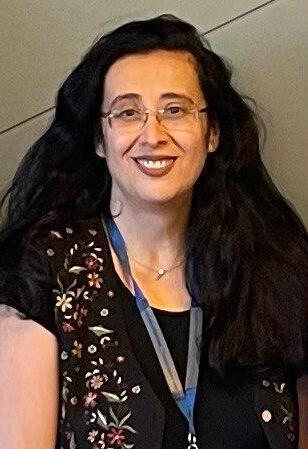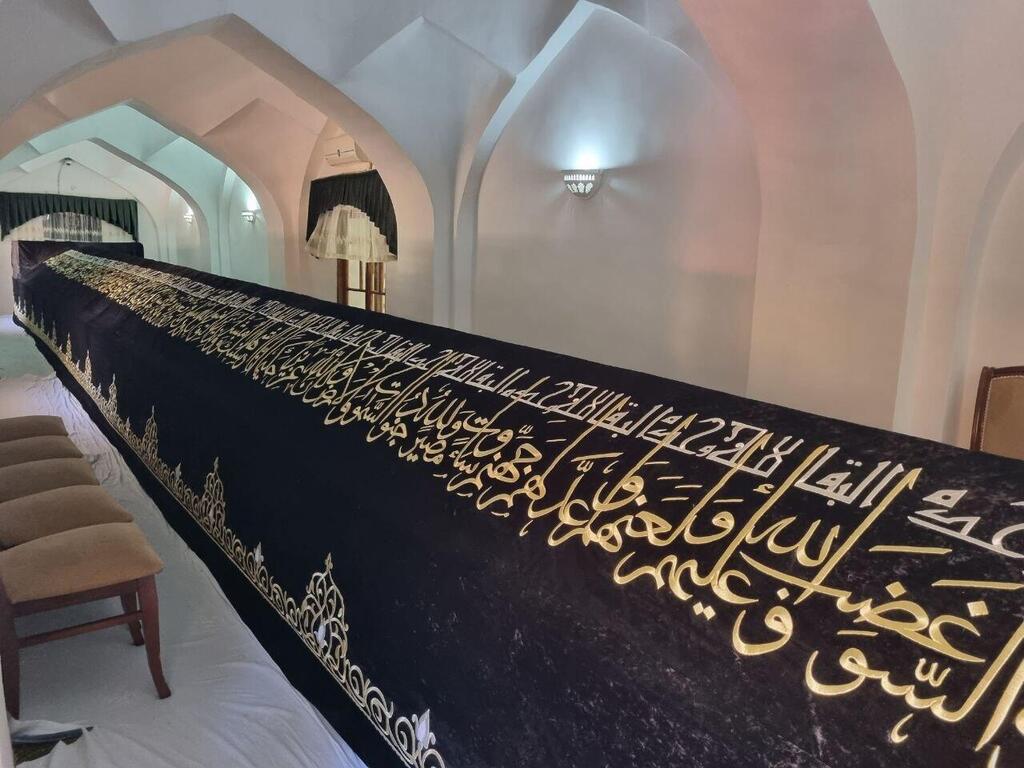The Jewish legacy of Uzbekistan
(Video: Itamar Eichner)
The Jewish school in Bukhara, Uzbekistan, is the only Jewish school in the world where the majority of its students are actually Muslims. Approximately 280 out of 400 students are Muslims, with only 80 being Jewish. The rest of the children in the school are Russians and non-Muslims.
Read more:
However, all students, including the Muslims, learn Hebrew, Jewish history and Jewish culture. Visitors to the school are greeted with the Hebrew song Hevenu Shalom Aleichem by Muslim students. While the Muslim children do not learn Jewish prayers, they take pride in studying at the Jewish school, considered one of the best in the country.
Presently, only 200 Jews reside in Bukhara. At its peak, the Uzbek city was home to 23,000 Jews, but most of them emigrated after the collapse of the Soviet Union. Braham Yitzhakov, the head of the Jewish community in Bukhara and the cantor of the ancient synagogue in the city, takes pride in the coexistence between Jews and Muslims in Bukhara. "Here, we live in peace and harmony with one another," says Yitzhakov, who asserts that there has never been any vandalism or antisemitic incidents.
Despite the community's decline, the president of Uzbekistan has assured that the Jewish school in Bukhara will never be closed and will continue to receive funding and expand.
Why would Muslim children attend a Jewish school?
"Because they receive a good education from first grade up to age 11."
Are you not afraid for the future of the Jewish community or the school?
"I am not afraid for the future of the community. Just now, five Jewish families returned to Bukhara from Israel, totaling 50 people. Jews have also returned here from the United States. People love living here. As for the school, even without the Muslim students, the school would not have been closed. The president of Uzbekistan promised that the school will not be shut down."
According to Yitzhakov, periods of security tensions in Israel are not felt in Bukhara. "Here, we are taught to respect one another and live in peace. We have no problems because we live as neighbors who love one another. The authorities offered me security during holidays, but I declined because we are respected here."
A thousand years of history
The ancient 420-year-old synagogue is swarmed with tourists from all over the world. A group of German tourists arrived at the same time we did. The attraction is two Torah scrolls, which, according to Yitzhakov, were written over 1,000 years ago.
"Experts from Israel and the U.S. examined the authenticity of the scrolls and proved it," he said. "During the Soviet era, they hid them. There is a belief that whoever touches the scrolls will have all his dreams come true."
The synagogue holds prayers three times a week, on Mondays, Fridays and Saturdays. Recently, the imam of Bukhara gifted the ancient synagogue two beautiful carpets. The governor of Bukhara allocated $150,000 two years ago to restore the ancient cemetery in the city, dating back over 1,250 years, where no less than 20,000 Jews are buried.
9 View gallery
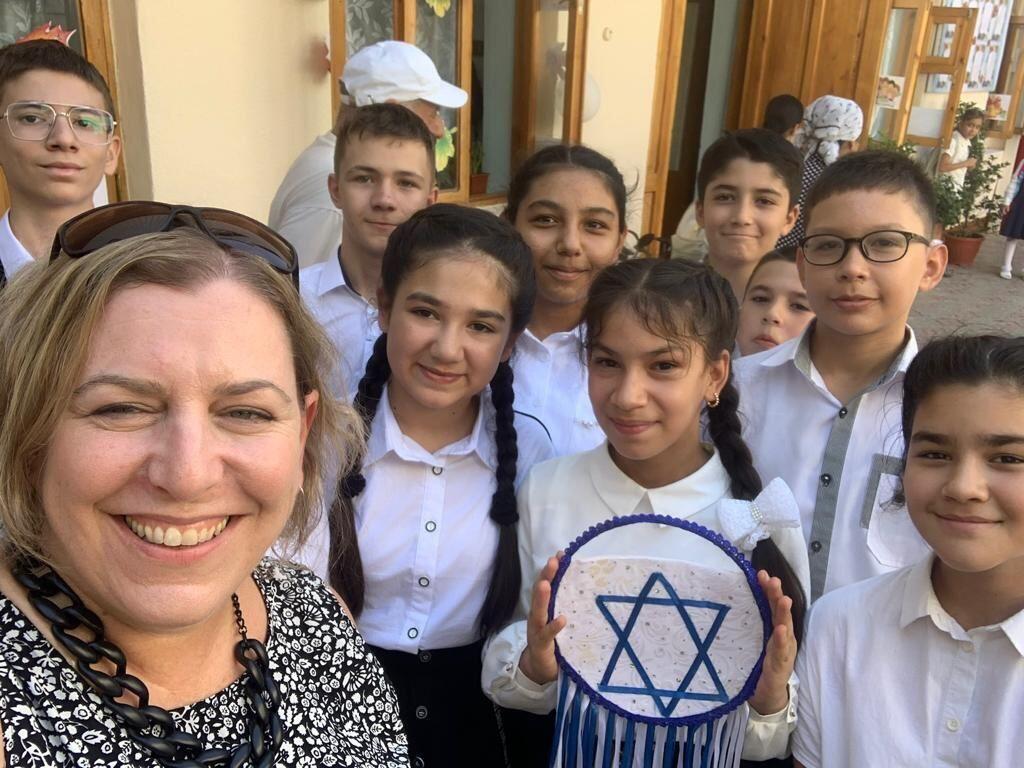

Israeli Ambassador to Uzbekistan Zehavit Be-Hillel at the Jewish school in Bukhara
(Photo: Itamar Eichner)
The daughter and grandchildren of Yitzhakov, 73, live in Israel. There is a street in Petah Tikva named in honor of his grandfather Rabbi Baruch Yitzhakov.
Would you like to move to Israel?
"I am not going anywhere. My role is to preserve and uphold the traditions here. I will stay here until the day I die. Many Israeli tourists visit here, as well as Jews from all over the world. Four years ago, we renovated the synagogue, and Muslims donated money for the restoration. We are an important part of the community here."
The Jewish cemetery in Bukhara also underwent extensive renovation with the help of the Bukhara governor. A wall was built recently in memory of the 500 Jews from the community who died in World War II. The place also contains graves over 300 years old that underwent substantial restoration. Even the 1,050-year-old ritual bath was renovated.
From 50 communities to one
In the courtyard of the synagogue in Samarkand, three chickens are running around, like in the days when kosher meat was slaughtered here. From the once large community, which had 48 synagogues, not much remains. There are only 140 Jews left in the city, and the last remaining synagogue, around 130 years old, is inactive. Most of the Jews living here are elderly or ill, and Jewish prayers or events are held only on holidays and when groups of Israelis visit.
Tamar Ladayev, the community elder and the wife of the local rabbi, welcomes us in the synagogue. On the wall hang pictures of all their rabbis throughout the generations. One of them immediately catches the eye: Rabbi Matityahu Aharoni, the grandfather of Chef Israel Aharoni.
"I can't remember the last time we had a wedding or a circumcision here," she says with sadness. Her three children immigrated to Israel. She dreams of joining them. Ladayev’s children are not the only ones; most of the Jews in Samarkand have emigrated to the United States, Austria, Germany and Israel.
Ladayev teaches Hebrew, but not to Jews - rather to Uzbek caregivers who come to Israel to care for the elderly. In Israel, there are more than 11,000 such caregivers. Due to the growing Uzbek community in Israel, the Uzbekistan Embassy allowed them to vote in the recent presidential elections held in 11 cities across Israel this week. These were Uzbekistan's first elections after a referendum on the constitution earlier this year, as part of the country's democratization process.
Incumbent President Shavkat Mirziyoyev won by an 87% landslide (out of 19.5 million voters with an impressive voter turnout of almost 80%). He defeated three other candidates. The elections were conducted in a fair and democratic manner, with no confrontations between candidates and polls were also prohibited.
Posters of the four candidates were seen all over the country, although everyone we spoke to was convinced that the incumbent president would win by a large margin - which ended up happening.
One of the important attractions in Samarkand is the tomb of the Prophet Daniel. There are many myths about the actual location of the tomb: some claim it is in Persia or Iraq, but Rabbi Yitzhak Barda and historian David Klenterov, who researched the subject, found ancient manuscripts indicating that the tomb is in Samarkand.
According to one of the beliefs in Uzbekistan, the father of the Uzbek nation, Amir Timur, brought the bones of the Prophet Daniel from Persia and buried them in Samarkand. The tomb's length is no less than 18 meters. The reason for its size: over the years, people tried to steal the Prophet's remains due to the attributed miracles, so they thought that if the tomb was large, the thieves wouldn't find the remains.
The tomb of Daniel has become a pilgrimage site for both Muslims and, more recently, for Jews as well. Prayers are held at the site, and the call to prayer from the muezzin rings throughout the speakers. Next to the tomb stands a thin iron pillar with a horse's tail hanging at its top - a symbol of a holy place in Uzbekistan. Near the tomb, there is a 15th-century pistachio tree and a spring believed to have magical healing properties and the ability to grant longevity.
As Israel-Uzbekistan relations warm up, Israelis can now reach the holy tomb through direct flights. Starting from July 5th, Uzbekistan Airways has launched flights between Samarkand and Tel Aviv.
Currently, two women are leading Israel-Uzbekistan relations: Uzbek Ambassador to Israel Feruza Makhmudova (the only woman to serve in this position), and Israeli Ambassador to Uzbekistan Zehavit Ben-Hillel. Both determined diplomats are pushing the relations forward with full force. Makhmudova states, "Since February 2018, Uzbekistan allows Israelis to enter without a visa for up to 30 days. In 2022, about 12,000 Israeli tourists visited our country."
Ben-Hillel adds, "The time has come to realize the enormous potential that exists in the relations between the two countries, especially in areas of agricultural technology, water, health and more. I hope to see not only a significant deepening of trade relations soon but also mutual high-level visits."
Uzbekistan, a huge country with a population of 36 million, most of whom are under 30, maintains a neutral foreign policy. One of the first actions of the president in 2017 was to close all border disputes with neighboring countries. Nowadays, the country is working to attract more investors, and it sees Israel as a highly attractive destination. There is interest in Israeli weapons in Uzbekistan, especially in light of military reforms promised by the president, but Israel remains cautious.
Relations are warming up
Alongside increasingly frequent diplomatic visits to the country, including the first visit of the head of the Defense and Security Department at the Defense Ministry, Dror Shalom, to the Israeli Embassy in Tashkent, there have been recent inquiries from Israeli companies interested in Uzbekistan.
Uzbeks view Israel as a successful model in various fields, particularly in water management and prosperity. They seek assistance from Israel in establishing a social worker and national insurance system in the country and hope that Israel will aid in setting up an Israeli hospital in Uzbekistan.
9 View gallery
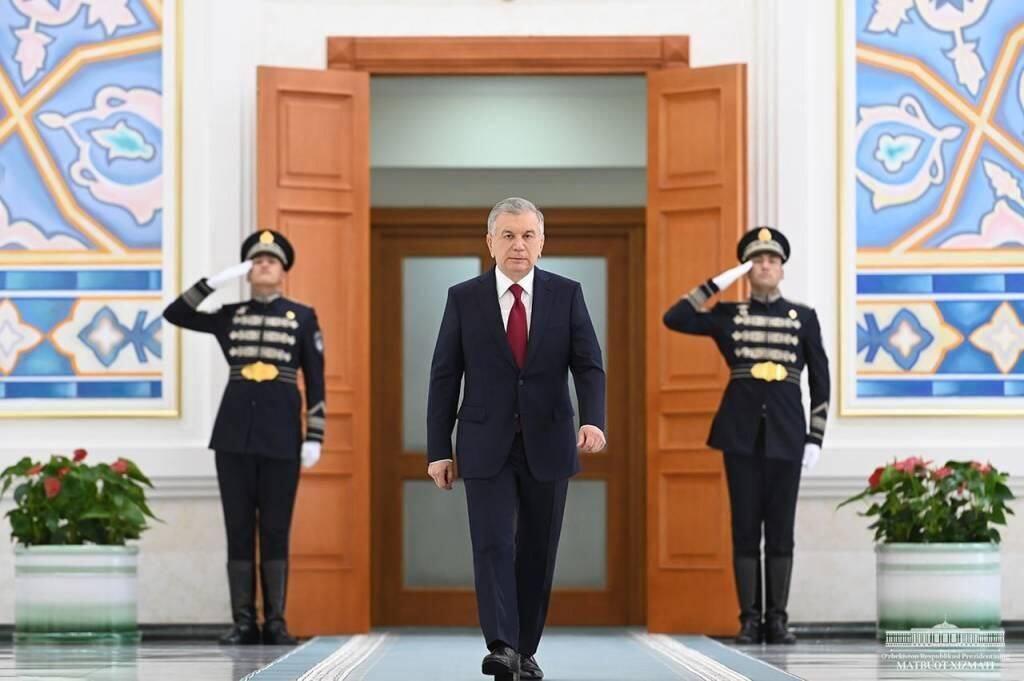

Uzbek President Shavkat Mirziyoyev
(Photo: The Office of the President of Uzbekistan)
Regarding UN votes, Uzbekistan historically voted against Israel. However, with the improved relations, there is hope in Jerusalem that would improve. A senior Israeli official states, "There is a strategic decision by Uzbekistan to 'warm up' relations with Israel, and the potential here is enormous."
Uzbekistan maintains strong economic ties with Iran, which is not particularly favored by Israel. However, Uzbekistan assures that this is purely economic and nothing more. Both Israel and Uzbekistan sense that they are on the cusp of a period of rapprochement and warming relations, which they both greatly desire.
What caused this change? Some argue it may be due to the Abraham Accords. It is also possible that the conflict in Ukraine made Uzbekistan realize it should not put all its eggs in the Russian basket.
- The writer was a guest at the Uzbekistan Embassy




